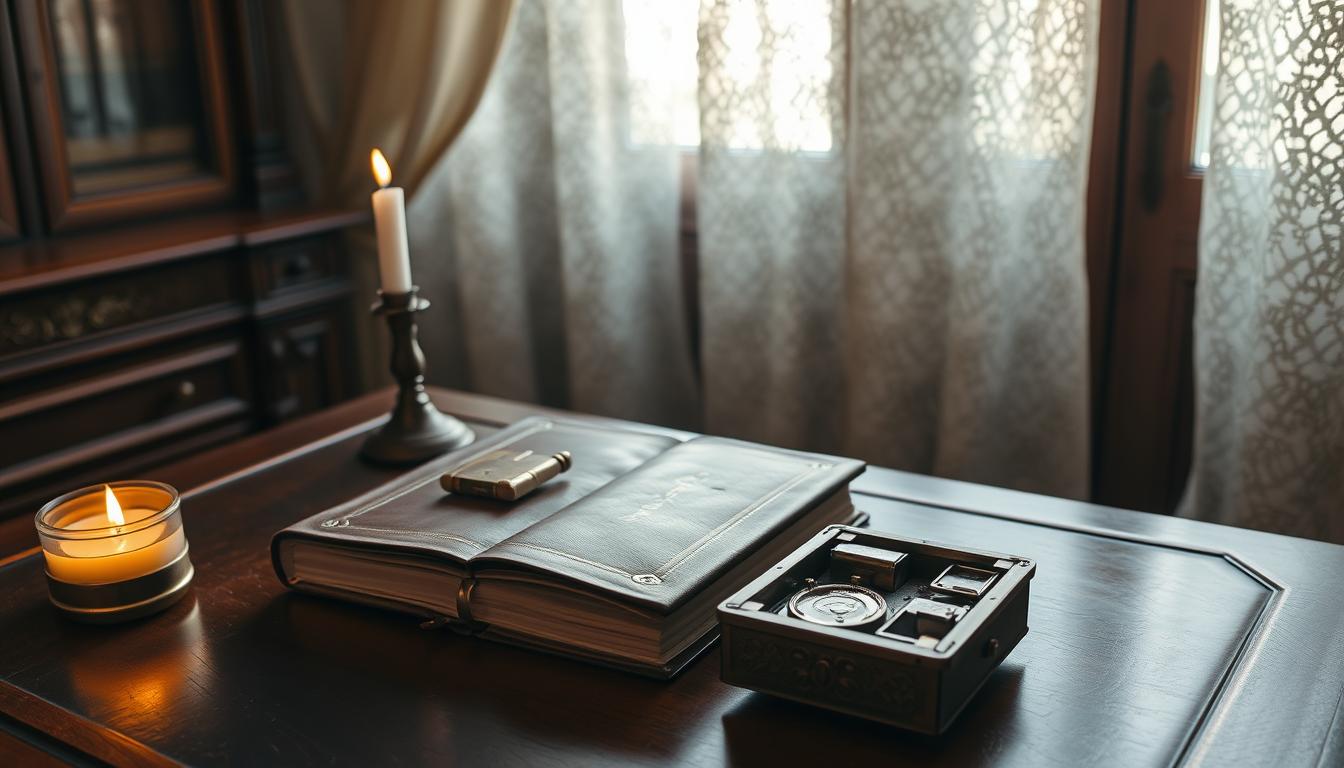Many journal writers worry about their diary’s security. Your private thoughts deserve protection. This guide will help you keep your diary safe from prying eyes.
A diary is more than just paper and ink. It’s a place for your deepest emotions and secret dreams. Protecting it means safeguarding your personal growth and emotional well-being.
Your right to privacy extends to your diary. With the right methods, you can build a fortress around your writings. We’ll explore clever hiding techniques and smart security measures.
Most journal writers feel better when their writing stays private. Your diary should be a judgment-free zone. It’s a place where you can express yourself freely.
Are you concerned about nosy people reading your diary? This guide offers practical strategies to protect your intimate thoughts. You’ll learn how to keep your writing secure from unwanted readers.
Understanding the Importance of Diary Security
Your personal diary is more than a collection of pages. It’s a sacred space for your deepest thoughts and private reflections. Privacy protection is essential for anyone who values writing privacy.
Journaling safety goes beyond hiding your notebook. It’s about creating a personal sanctuary for exploring your inner world freely.
Why You Need to Protect Your Thoughts
Your diary entries capture your most personal experiences. They hold intimate emotional discoveries and sensitive challenges. Your vulnerable self-reflections are also stored within its pages.
- Raw, unfiltered personal experiences
- Intimate emotional discoveries
- Sensitive personal challenges
- Vulnerable self-reflections
Identifying Potential Risks
Unauthorized access to your diary can cause significant emotional distress. The risks include exposing your vulnerabilities and damaging relationships. It can also compromise your personal safe space.
| Risk Type | Potential Consequence |
|---|---|
| Personal Invasion | Emotional vulnerability exposed |
| Trust Breach | Relationship damage |
| Confidentiality Compromise | Loss of personal safe space |
The Emotional Value of Your Diary
Your diary is a healing tool, a confidential companion that witnesses your growth. Protecting it preserves your authentic self, free from external pressures.
“A diary is your most loyal friend, keeping your secrets safe and your memories intact.”
Nearly 50% of people feel uncomfortable with privacy invasions. Securing your diary is crucial for maintaining your emotional well-being. It’s essential for preserving your personal integrity.
Choosing the Right Diary for Security
Protecting your personal thoughts requires careful selection of the right diary. Your journal is a sanctuary for your most intimate reflections. Understanding protection methods will help you safeguard your private writings effectively.
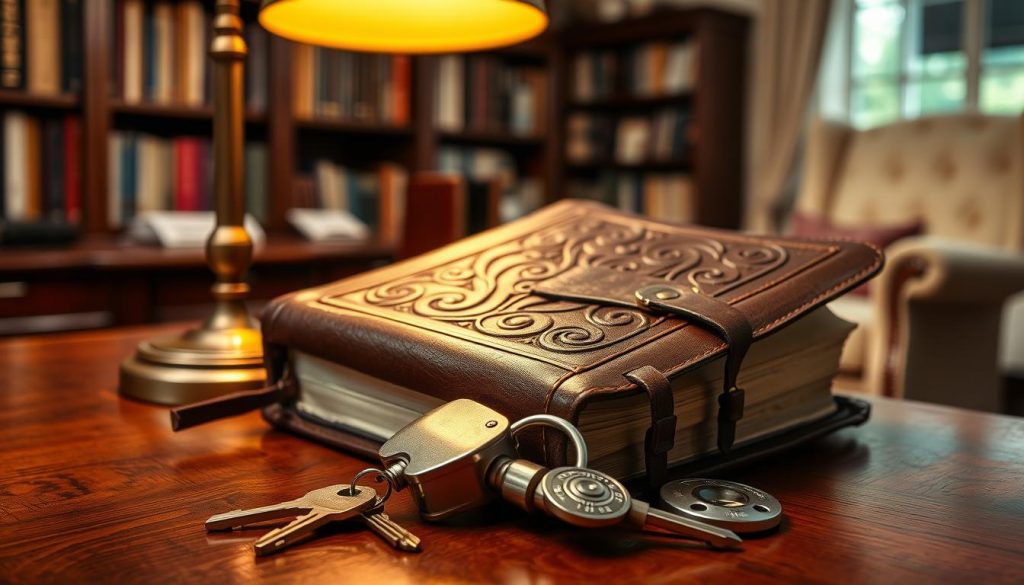
When selecting a lock diary, consider factors that enhance your privacy. Different designs offer unique security features tailored to your needs.
Lockable Diary Options
Modern diary security has evolved beyond traditional lock and key mechanisms. Today’s options include:
- Traditional key-based locks
- Digital passcode journals
- Biometric access diaries
- Smart journals with app integration
Hidden Diary Designs
Creative concealment can be an excellent protection method. Some innovative designs include:
- Journals disguised as ordinary books
- Diaries with camouflage covers
- Journals with secret compartments
Privacy Features to Look For
| Feature | Security Level | Recommended For |
|---|---|---|
| Physical Lock | Medium | Home Use |
| Digital Encryption | High | Tech-Savvy Users |
| Hidden Storage | High | Maximum Privacy |
*”Your diary is a personal sanctuary—protect it wisely.”*
Most users prioritize privacy features when choosing a journal. Invest in a diary that matches your security needs and protects your innermost thoughts.
Using Physical Barriers for Protection
Your diary needs strong protection from prying eyes. Strategic physical security measures are key. These go beyond simple hiding techniques.
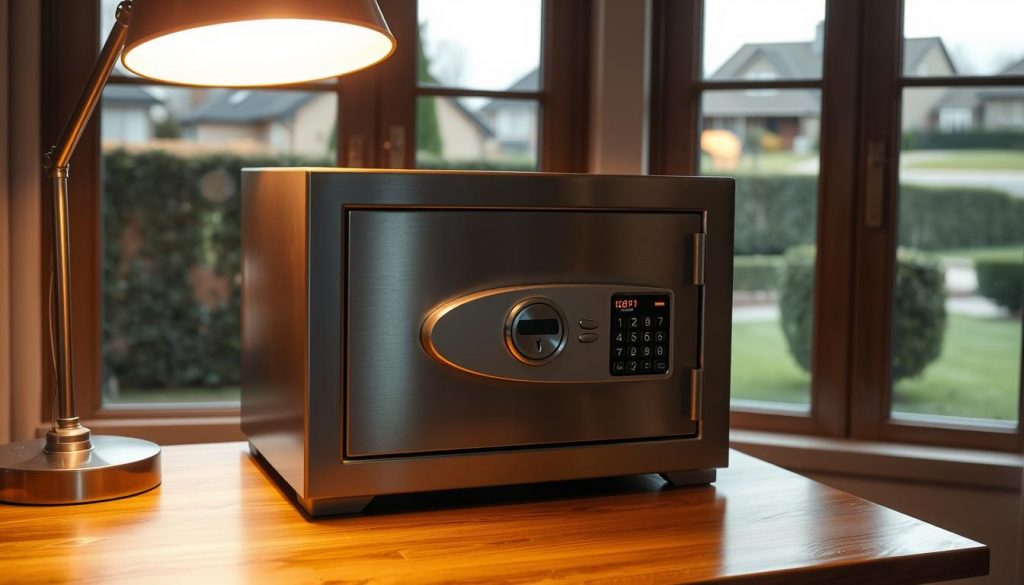
Effective diary protection uses multiple layers of physical security. Here are some essential strategies to keep your private writings safe.
- Invest in a small home safe for ultimate diary protection
- Create hidden storage spaces within furniture
- Use innovative concealment techniques
- Implement multiple security barriers
Simple Lock and Key Techniques
Traditional lock and key mechanisms offer basic yet effective protection. Choose a lock that’s difficult to pick but easy for you to use. Many compact diary locks provide excellent security without being bulky.
“Your diary is a sanctuary of personal thoughts – protect it wisely.”
Storing Your Diary in a Secure Location
Smart diary placement can boost your privacy. Here are some secure storage options to consider:
- High shelves out of immediate reach
- Locked drawer with hidden key
- Behind other less interesting books
- Inside a locked cabinet
Utilizing Secret Compartments in Furniture
Furniture can hide your diary in unexpected ways. Secret compartments in headboards or under false drawer bottoms work well. Hollowed-out book designs also offer creative hiding solutions.
Careful planning and creative thinking are crucial. These will help you develop a strong physical security strategy. Your diary will stay safe from unwanted readers.
Employing Disguises and Concealment
Protecting your diary requires creative and strategic thinking. Privacy goes beyond simple locks. It’s about making your personal writing invisible to prying eyes.
Your writing security depends on clever concealment techniques. These methods blend your diary into everyday surroundings.
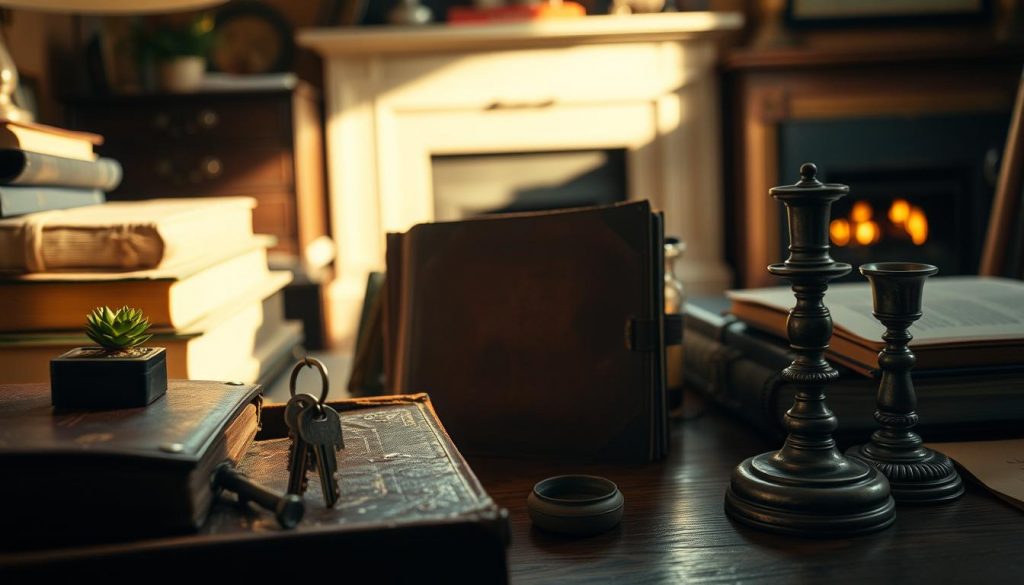
Hiding a diary means transforming it into something unremarkable. Research shows disguises can reduce recognition by about 30%. This makes your concealment strategy potentially powerful.
Common Household Items as Disguises
Transform your diary to blend with your environment. Here are some creative hiding methods:
- Hollowed-out book with secret compartment
- Inside a decorative storage box
- Disguised as a textbook or academic notebook
- Wrapped in an uninteresting magazine cover
Creative Storage Ideas
Strategic placement is key to physical writing security. Explore unusual storage spots that make your diary nearly invisible:
| Location | Concealment Effectiveness |
|---|---|
| Bottom of underwear drawer | High |
| Inside winter boot box | Medium-High |
| Behind cookbooks in kitchen | Medium |
Everyday Objects as Unexpected Hiding Spots
Creativity is your best defense when protecting personal writings. Consider these surprising hiding techniques:
“Security is not about perfection; it’s about making discovery difficult and improbable.” – Anonymous Privacy Expert
- Inside a sealed ziplock bag within a cleaning supplies container
- Tucked between rarely used board game boxes
- Within a large, ancient photo album
- Behind stack of old electronic manuals
The goal is to make your diary blend into the background. It should remain accessible to you. Your privacy matters, and these strategies can keep your thoughts secure.
Implementing Personal Security Measures
Protecting your journal requires more than physical barriers. Personal security methods can safeguard your intimate thoughts effectively. Privacy tips are crucial for maintaining your diary’s confidentiality.
Developing a personal security system needs creativity and strategy. Your journal’s privacy relies on innovative approaches. These methods should make your writing unreadable to others.
Creating Your Personal Code
A unique code can significantly boost your journal’s security. Consider these strategies:
- Develop a personal shorthand language
- Use symbolic representations for sensitive topics
- Create acronyms only you understand
- Mix languages or use invented words
Routine Security Checks
Regular security methods help maintain your journal’s protection. Implement these practices:
- Weekly storage location verification
- Monthly code system review
- Quarterly hiding spot rotation
Trusted Friend Guidelines
Sharing security tips requires careful thought. Choose confidants who respect boundaries:
| Criteria for Trusted Friends | Recommended Actions |
|---|---|
| Proven Discretion | Share minimal details |
| Strong Ethical Standards | Discuss privacy expectations |
| Long-term Relationship | Gradual information sharing |
“Your journal is a sanctuary of personal thoughts. Protect it with the same care you would protect your most valuable possession.”
Journal privacy is a personal journey. Your security methods should adapt as your life changes. This ensures your thoughts remain exclusively yours.
Digital Solutions to Enhance Security
Protecting your writing privacy has evolved in the digital age. Digital security offers innovative ways to safeguard personal thoughts. It also provides convenient backup options for your diary.

Securing your diary digitally goes beyond traditional methods. Cyber threats are on the rise, affecting businesses of all sizes. This highlights the need for strong digital protection strategies.
Digitizing Sensitive Entries
Converting your physical diary to digital format can boost privacy protection. Here are some key strategies to consider:
- Use encrypted journaling apps with strong password protection
- Create backup copies in secure cloud storage
- Implement two-factor authentication for additional security
Password-Protected Apps for Your Diary
Modern journaling apps offer top-notch digital security features. Look for applications that provide:
- Military-grade encryption
- Automatic logout mechanisms
- Hidden folder options
- Selective sharing controls
“Your diary is a sanctuary of personal thoughts – protect it with the same vigor you would protect your most valuable possessions.”
Safeguarding Digitized Notes
Many large organizations invest in advanced security technologies. Apply similar principles to your personal digital writing privacy. Here’s how:
- Regularly updating application security
- Using unique, complex passwords
- Avoiding public Wi-Fi when accessing sensitive documents
Digital security techniques can create a strong shield for your intimate thoughts. Embrace these methods to keep your memories safe and secure.
Creating a Safe Writing Environment
Private writing needs a secure and comfortable space. Your journaling safety depends on choosing the right environment. It’s crucial to protect your intimate thoughts and experiences.
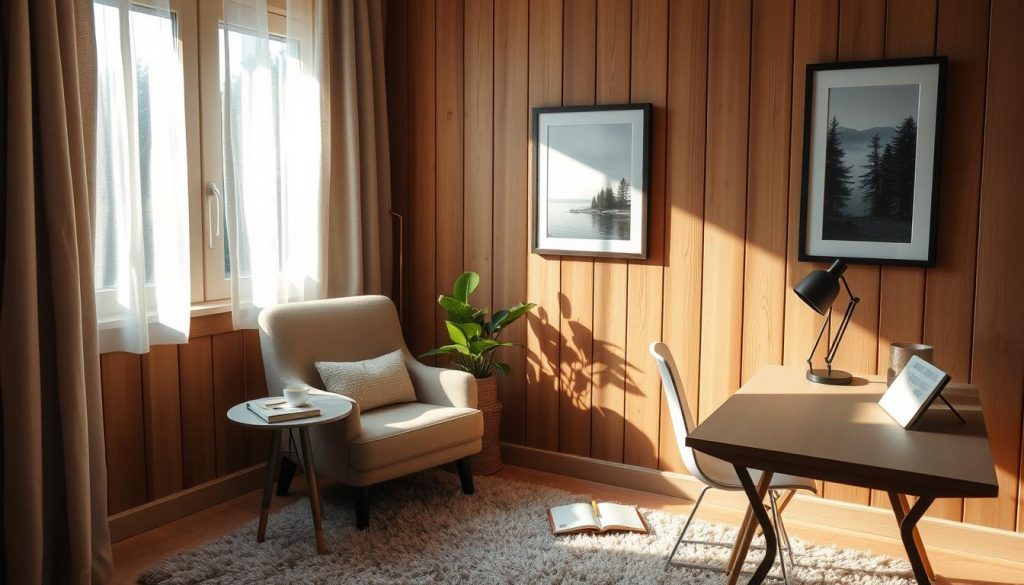
- Choose a quiet, isolated location
- Ensure physical privacy from potential interruptions
- Create a personal sanctuary for self-expression
Choosing the Right Time and Place
Finding the perfect moment for private writing requires planning. Pick times when you’re least likely to be disturbed. Early morning or late evening often work best.
Your writing space should feel completely personal and inviolable. It’s your safe haven for self-expression.
Minimizing Distractions During Writing
Successful private writing needs a distraction-free environment. Consider these strategies to stay focused:
- Turn off electronic devices
- Use noise-canceling headphones
- Create a dedicated writing nook
Ensuring Your Space Feels Secure
Psychological safety is key for genuine self-reflection. Your writing environment should be a judgment-free zone. Here, you can explore your deepest thoughts without fear.
“The most important thing is to create a space that feels completely yours.” – Anonymous Journaler
| Environment Factor | Security Level | Recommended Action |
|---|---|---|
| Physical Location | High | Private room, locked door |
| Digital Protection | Medium | Password-protected devices |
| Emotional Safety | Critical | Judgment-free personal space |
Your writing sanctuary is a personal refuge for free-flowing thoughts. Protect it like your most valuable possession. It’s where your ideas can bloom safely.
Encouraging Respect for Privacy Among Friends
Protecting your diary privacy needs clear communication and boundaries. Understanding privacy’s social dynamics helps maintain private writing sanctity. It also preserves healthy relationships.
Privacy is more than keeping secrets. It’s crucial for personal growth and emotional regulation. The Systems Model of Privacy highlights two key functions:
- System maintenance: Emotional recovery and stress management
- System development: Self-evaluation and creative thinking
Setting Boundaries with Shared Spaces
In shared living spaces, clear privacy boundaries are vital. Your personal space deserves respect. Communication is key to achieving this goal.
Communicating Your Need for Privacy
Discuss privacy with empathy and clarity. Explain that your private writing is a personal sanctuary. It helps with emotional processing and self-reflection.
Asking Friends to Support Your Privacy Efforts
Create a trust agreement outlining your expectations. Be direct about your boundaries. Show that you value your relationship with others.
| Privacy Strategy | Implementation |
|---|---|
| Physical Boundaries | Designate personal storage areas |
| Communication | Express privacy needs openly |
| Mutual Respect | Create shared understanding |
“Privacy is not about hiding something. It’s about protecting something valuable: your inner world of thoughts and emotions.”
Effective privacy protection builds trust and maintains healthy relationships. It respects individual boundaries while fostering understanding among friends.
Identifying Trusted Individuals for Sharing
Your journal privacy needs careful thought. Not everyone feels comfortable sharing private writing. Choosing the right confidant requires reflection.
Thoughtful selection of a trustworthy person is crucial. It’s important to protect your most personal thoughts.
When picking someone to share your innermost thoughts, consider these key factors:
- Demonstrate consistent trustworthiness
- Show respect for personal boundaries
- Understand the value of confidentiality
- Possess emotional intelligence
Creating a Trust Framework
Set up a privacy protection agreement with your chosen confidant. This helps maintain clear expectations. The informal contract should outline:
- Specific sharing limitations
- Mutual understanding of discretion
- Consequences of potential breaches
Encouraging Respectful Sharing
The right person will grasp the emotional weight of your private writing. Communication is key in maintaining trust and protecting your story.
“Trust is like a vase… once it’s broken, though you can fix it, the vase will never be the same again.” – Walter Anderson
| Confidant Qualities | Importance Level |
|---|---|
| Active Listening Skills | High |
| Emotional Maturity | Critical |
| Non-Judgmental Attitude | Essential |
Your journal is a sacred space. Choose wisely and protect your privacy. Make intentional, thoughtful decisions about sharing.
Regularly Reviewing Your Security Practices
Protecting your physical diary requires ongoing attention and planning. Security methods change over time. Regular reviews help keep your private thoughts safe from prying eyes.
Adapting your privacy protection strategies is crucial. This ensures your diary remains secure as new risks emerge.
Stay proactive about diary security with a consistent review schedule. Here are some key practices to consider:
- Assess your current security measures every 3-6 months
- Update storage locations periodically
- Evaluate potential new risks in your environment
- Check the condition of locks and protective mechanisms
Staying Current with Security Trends
Technology and security landscapes change quickly. Learn about new privacy protection techniques. This can greatly improve your diary’s safety.
| Security Review Frequency | Recommended Actions |
|---|---|
| Quarterly | Physical lock inspection |
| Bi-Annually | Storage location assessment |
| Annually | Comprehensive security method evaluation |
Adapting to Life Changes
Your security needs shift with personal circumstances. Moving to a new home, starting a new relationship, or changing living arrangements affect your diary’s safety.
These changes require a fresh look at your protection strategy. Stay alert and adjust as needed.
“Your diary’s security is a dynamic process, not a one-time solution.” – Privacy Expert
Most security pros consider protection strategies highly important. Your personal diary deserves the same careful thought and upkeep.
Conclusion: Your Diary, Your Secrets
Protecting your physical diary safeguards your most intimate thoughts and personal reflections. Privacy protection ensures you can express yourself freely without fear. Your diary is a sacred space for vulnerability and creativity.
Physical diary security strategies empower you to explore deep emotions and experiences. Journaling can reduce stress and enhance mental well-being. Feeling secure unlocks powerful opportunities for self-discovery and growth.
Empowering Yourself Through Security
Your diary’s security is uniquely personal. What works for one person might not work for another. Trust your instincts and develop a protection system that feels comfortable.
Choose lockable journals, hidden storage, or digital backup methods. The goal is creating a safe space for honest self-expression.
Final Thoughts on Diary Safety
Your private writing deserves respect and protection. By prioritizing security, you’re preserving your most authentic self. Stay vigilant and adapt your strategies as needed.
Never compromise the sanctity of your personal journaling experience. Your diary is a gateway to self-discovery and growth.
FAQ
Why is it important to keep my diary private?
Your diary is a personal space for self-reflection and emotional expression. It protects your intimate thoughts and prevents breaches of trust. Keeping it private ensures you can write freely without fear of judgment.
What are the best ways to secure a physical diary?
Use diaries with built-in locks and store them in hidden locations. Try creative concealment techniques like disguising it as a common item. Implement personal security measures such as creating a unique code or writing system.
How can I hide my diary effectively?
Camouflage your diary as a book on a shelf. Use secret compartments in furniture or store it in unexpected places. Try hiding it inside a hollowed-out object or using a lockbox that blends in.
Are digital backup methods safe for my diary entries?
Digital backups can be secure with password-protected apps and encryption methods. Use secure cloud storage and strong passwords for added protection. Consider two-factor authentication to enhance security further.
How often should I review my diary security practices?
Review your security measures every few months. Do this also when significant life changes occur. These changes may include moving, starting a new relationship, or changing living arrangements.
What if I live with family or roommates who might be curious?
Set clear boundaries and communicate your need for privacy respectfully. Use multiple security layers like locks and hidden storage. Consider creating a personal code that only you understand.
Is it ever okay to share my diary with someone?
Choose a trusted confidant carefully if you decide to share. Establish clear expectations about privacy before sharing any entries. Create an informal trust agreement to protect your privacy.
What’s the best type of diary for maximum security?
Look for diaries with built-in locks and hardcover designs. Choose options with key locks or combination locks. Consider diaries that can be easily hidden or disguised.
How can I create a secure writing environment?
Choose a private time and space where you won’t be interrupted. Minimize distractions and ensure you have personal space. Create a comfortable setting that makes you feel safe while writing.
What should I do if someone has already read my diary?
Address the breach directly and express your feelings about the privacy violation. Implement stronger security measures to prevent future incidents. Have a serious conversation about respecting personal boundaries.
Source Links
- 7 Ways to Keep Your Journal Private
- How to Keep a Secret Diary: 10 Steps (with Pictures) – wikiHow
- Tips for Keeping Your Journal Private and Safe
- Why is Physical Security Important?
- How to Keep a Journal Private
- Privacy and Security in Journaling: What You Need to Know
- The Ultimate Guide to Choosing Features That Enhance Your Journaling Experience – GLOBAL DIARY
- What is Physical Security & Why is it Needed?
- Physical Access Control System (PACS) – Your Complete Guide
- Security through obscurity
- Study Reveals Disguises are Effective
- What is Physical Security? Meaning, Measures and Best Practices
- Security Measures in the Workplace: Proper Implementation!
- NIST SP 800-12: Chapter 15
- Connecting the dots where physical and digital security intersect
- Digital transformation in the physical security world
- 2 Physically Protecting Sensitive Data | Handbook on Using Administrative Data for Research and Evidence-based Policy
- How can teachers increase the chances that their students will behave appropriately?
- More Than Defense in Daily Experience of Privacy: The Functions of Privacy in Digital and Physical Environments
- Privacy, monitoring and trust: pre-teens and teenagers
- The risk of re-identification versus the need to identify individuals in rare disease research
- SP 800-53 Rev. 5, Security and Privacy Controls for Information Systems and Organizations
- Identifying Credible Sources of Health Information in Social Media: Principles and Attributes
- Security Convergence: Why Physical Security requires a Cybersecurity focus
- Ensuring physical security in uncertain times – Uptime Institute Blog
- Why journalling is good for you – Ambreen Arshad
- password-managers-feat-image
- The Diary Of My Perfection

